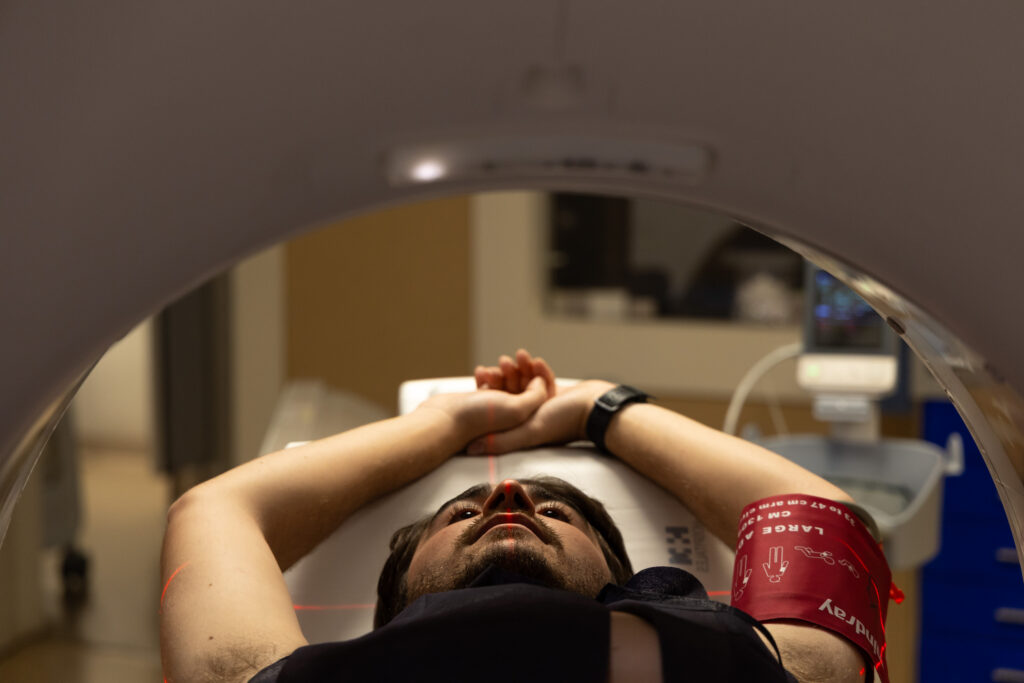Triple Cardiac CT Study
What is a Triple Cardiac CT Study?
The Triple Cardiac CT Study is a combination of three cardiac Computed Tomography (CT) techniques used to obtain a comprehensive evaluation of heart health. This integrated approach may include:
- Coronary Calcium CT: to quantify the amount of calcium in the coronary arteries, indicating the presence and extent of atherosclerosis.
- Coronary CT Angiography: to visualize the coronary arteries and detect obstructions or narrowings.
- Myocardial Perfusion CT: to evaluate blood flow to the heart muscle at rest or under stress, which can reveal areas of ischemia (lack of oxygen).
What is this diagnostic test for?
The main uses of the Triple Cardiac CT Study are:
- Comprehensive cardiovascular risk assessment: provides information on the burden of atherosclerosis, the anatomy of the coronary arteries, and myocardial perfusion, allowing for a more complete cardiovascular risk assessment.
- Detection of coronary artery disease: allows for the detection of obstructive and non-obstructive coronary artery disease.
- Evaluation of myocardial ischemia: helps identify areas of the heart muscle that do not receive enough blood flow.
- Treatment planning: facilitates informed decision-making regarding patient treatment and management, including the need for interventions such as angioplasty or coronary bypass surgery.
Benefits of High Technology in the Triple Cardiac CT Study
This diagnostic test offers a series of key benefits thanks to the technology it uses:
- Comprehensive evaluation: provides a complete assessment of heart health in a single session.
- Non-invasive: it is a non-invasive technique, meaning it does not require surgery or incisions.
- Detailed images: allows for detailed images of the heart and its blood vessels.
- Accurate diagnosis: facilitates an accurate diagnosis of coronary artery disease and myocardial ischemia.

What does the procedure involve?
The procedure may vary depending on the specific protocol used at each center. In general, the procedure unfolds as follows:
-
Preparation:
You will be asked to fast for 4 to 6 hours prior to the test. You may also be asked to avoid caffeine and other stimulants before the study.
-
During the test:
You will lie on a table that slides into the CT scanner. Electrodes will be placed on your chest to monitor your heart rate and a cuff on your arm to measure your blood pressure. An intravenous line will also be placed in your arm. You may be given medication to lower your heart rate (beta-blockers) and/or dilate your coronary arteries (nitroglycerin). Next, the procedure will be explained to you, and you will be asked to remain calm and hold your breath briefly during image acquisition. Several CT image acquisitions will be performed, including coronary calcium CT (without contrast), coronary CT angiography (with contrast), and myocardial perfusion CT (with contrast, at rest or under stress). The total duration of the procedure can vary between 30 and 60 minutes.
-
After the test:
Once image acquisition is complete, the intravenous line will be removed. You will be advised to drink plenty of fluids to help eliminate the contrast medium from your body.
Recommendations for the test
Remember that it is important to follow these recommendations to ensure the quality of the study and your comfort:
- Inform your doctor: if you have allergies, especially to iodine or iodinated contrast. You should also inform if you are pregnant or have kidney problems.
- Medications: be sure to inform about any medications you are taking, especially beta-blockers, diabetes medications, or kidney problems.
- Fasting: follow the fasting instructions provided by your doctor or the radiology center staff.
- Clothing: wear comfortable clothing and avoid jewelry or metallic accessories that may interfere with the image.
Are there any risks?
The Triple Cardiac CT Study is generally safe, but like any medical procedure involving radiation and contrast medium, it has some minimal risks to consider:
- Radiation exposure: CT uses radiation, and the total dose may be higher than that of a single cardiac CT study. Generally, once prescribed, the risks are much lower than the benefits.
- Reaction to contrast medium: some people may experience allergic reactions to the contrast medium. In case of occurrence, medical staff are prepared to manage these situations.
- Kidney problems: the contrast medium can affect kidney function, especially in patients with pre-existing kidney disease. Special precautions will be taken if you have a history of kidney problems.
- Discomfort: some people may experience discomfort during the injection of the contrast medium or during breath-holding.
For your test to go smoothly, we ask that you arrive in advance of your scheduled time. This will allow us to complete the necessary administrative and clinical preparation.
Before the test, we will provide you with the Informed Consent form, a document with important information that you must read and sign.
If your appointment is for a Magnetic Resonance Imaging (MRI), it is crucial that you inform us about the presence of pacemakers, metallic objects, prostheses (including dental ones), tattoos, or medication infusion devices, such as insulin pumps.